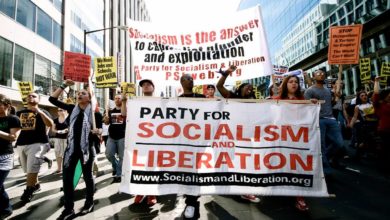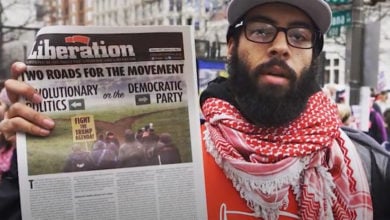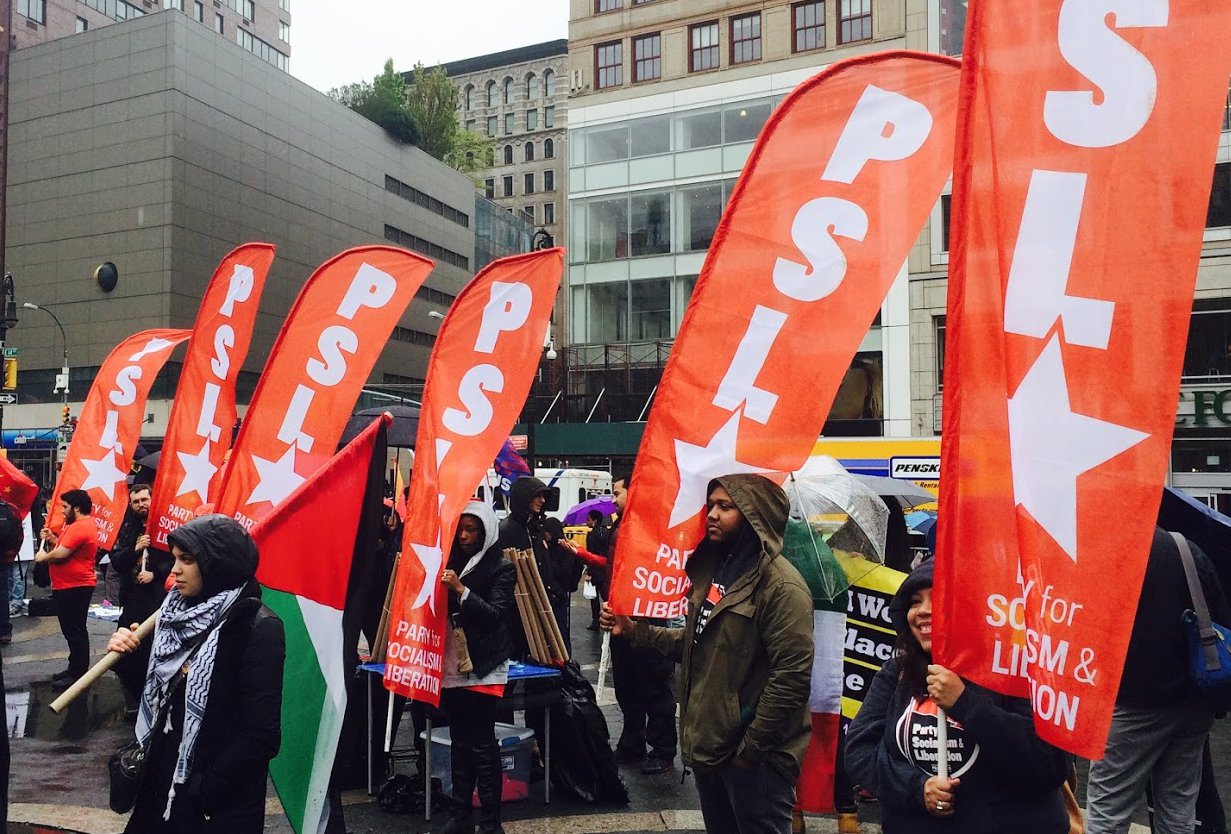Following is a talk given in a panel
titled “Resisting U.S. imperialism: Is it just bad policies or the system?” at
the Nov. 13-14, 2010, National Conference on Socialism sponsored by the Party
for Socialism and Liberation.
Despite claims of victory, the U.S. wars and policies of
aggression continue throughout the Middle East and Central Asia. To the U.S.
corporate ruling class, control over the Middle East means billions of dollars
and cents. To the people of the Middle East and the young U.S. workers fighting
these wars of aggression, U.S. control over the Middle East means death and
oppression.
For the past 60 years, U.S. imperialism has tried to control the
region as part of a larger strategy of economic and political dominance. First,
U.S. oil companies hold 70 percent of the world’s known and declining oil
reserves, and seek to dominate more. Iraq and Iran hold the third and fourth
largest oil reserves in the world, the first largest being in Saudi Arabia, a
U.S. client regime. Second, as the crossroads of Europe, Asia and Africa, the
Middle East is in a geo-strategic and militarily important position.
So, to secure its economic hegemony, Washington has worked to
destroy any independent states and popular movements in the region. As long as
capitalism has been the dominant mode of economic production, capitalist
countries have fought amongst themselves and carved up the Middle East and
Central Asia for their interests. Iraq was one piece of this pie.
The map of the modern Middle East was drawn after World War I—the
first imperialist world war. Capital was being concentrated in fewer hands, and
monopolies developed in place of “free” markets. The need for ever-greater
profits pushed capital beyond national boundaries to colonies that had before
been exploited for raw materials.
When the whole world was controlled by one imperialist power or
another, competition and war among them became inevitable. In the wake of the
Russian Revolution of 1917, the Bolshevik revolutionary leadership revealed
secret treaties among the imperialist powers to divide the Middle East among
themselves. Iraq was no exception.
From 1920 to 1958, Iraq was a British colony. Its
oil was 100 percent foreign owned, divided between U.S., British, French and
Dutch companies: BP, Chevron, Total, Shell and others. While these private oil barons profited from
Iraq’s rich resources, the vast majority of Iraqis suffered from extreme
poverty, 80 to 90 percent illiteracy, and little chance of ever seeing a doctor
or receiving an education.
These corporations were not interested in Iraq
alone. BP, originally called the Anglo-Persian Oil Company, was founded in 1908.
Anglo-Persian was later renamed the Anglo-Iranian Oil Company and then the
British Petroleum Company; it was the first company to plunder Mid-Eastern oil
reserves. Barely any was used for the benefit of the Iranian people.
U.S. interests in the Middle East have never had anything to do
with human rights, democracy or justice. The rhetoric of democratizing the
Middle East relies more on racism than reality. The people of the Middle East
are no less capable of constructing social and economic democracy than are
their white colonial capitalist occupiers.
After nationalist leader Prime Minister Mohammad
Mossadegh nationalized Iran’s oil to share the country’s wealth with the
people, the CIA engineered a coup in 1953. The U.S.-backed Shah denationalized
the oil and Anglo-Iranian continued to make profit with the caveat that it had
to split its share with U.S. oil giants.
Iraq was able to nationalize its oil reserves in
1972 after the revolution that kicked out the British. Just seven years
later, the people of Iran again rose up to throw out imperialism in a
revolution of their own.
Iraq’s oil revenue modernized the country,
dramatically improving living conditions. It funded free, quality health care
and a world-renowned university system—also completely free. But this cut into
the bottom line for the oil giants. In response, U.S. imperialism instigated
its oil-wealthy targets to fight each other in a zero-sum war through 1988.
Washington “supported” both sides in hopes of destroying them both.
After the Iran-Iraq war, the United States
imposed sanctions on Iraq in 1990, and later invaded. As a result of these
sanctions, 7,000 to 10,000 people died each month. In 1998, the Clinton
administration announced the official policy of “regime change” in
Iraq. U.S. Mid-East policy thereafter has continued to serve the corporate
interests of the rich.
U.S. imperialism has changed its tactics in the
Middle East if not its underlying goals. While it attacks Iran with sanctions
and threats, it has not yet militarily invaded. In Iraq, the proclaimed end of
combat operations has not stopped killing U.S. service members and Iraqis.
Washington was forced to pay resistance forces to
stop fighting because it could not contain the resistance. Over 50,000 troops
and a monstrous embassy the size of Vatican City remain in Iraq. Meanwhile, U.S. companies have at long last
secured contracts to Iraq’s oil and natural gas.
The U.S. military has moved forces from Iraq to
support its efforts in Afghanistan. Afghanistan and Pakistan, which border Iran
to the east, are other important regional footholds for imperialism.
Yet despite their relentless effort to bring the people of Iraq
and Afghanistan to their knees, the leaders of the most powerful war machine
ever have been unable to secure military victory. After years of war with no
end in sight, the Pentagon brass and the White House have watered down their
ambitious goals to a more attainable one: avoiding the appearance of defeat.
They continue to send troops to kill and be killed so that the generals will
not have to publicly admit that these wars cannot be won. U.S. officials have
already started exploring a compromise with the Taliban in Afghanistan. They
also know that if U.S. soldiers leave Iraq entirely, it will return to a path
independent of U.S. interests. The Iraqis will never quietly accept U.S.
dominance.
The resistance in Iraq and Afghanistan has shown the world that
the U.S. military is not all-powerful or invincible. They are inspiration to
all who are fighting imperialist domination. By bogging down the U.S. war
machine, they have given breathing room to other U.S. targets, such as Iran.
Their struggle is an international struggle; they are one with the struggles of
working-class and oppressed peoples around the world.
The wars in Iraq, Afghanistan and Pakistan are bloody acts of
aggression. They do nothing to better the condition of the working class in the
United States. The capitalists are not interested in ensuring that people have
access to energy or that we live in peace. Rather, the U.S. government
represents corporate interests who need the security of the U.S. military.
In the United States, we must stand vocally and visibly in
solidarity with the struggles of the people of the Middle East against
profiteering and aggression. We must expose the interests that the Pentagon
serves under both Republicans and Democrats: those of the weapons
manufacturers, the banks, and the private owners of natural resources. As an
independent movement, we can fight against U.S. imperialism for freedom and
self-determination for all.





